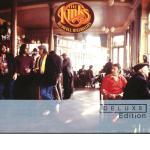
The Kinks Muswell Hillbillies - Deluxe Edition
(Universal UK)
It wouldn’t be courting controversy to conclude that Lola Versus the Powerman and the Moneyground, Part One, with its dual classics, Lola and Apeman, marked the end of the Kinks as a unit that could consistently deliver an albums worth of killer songs, unified in spirit if not always in subject matter. The amazing run that began with Face to Face, typically ends here with the casual fan. And while most acknowledge that the band still had many great songs and even strong albums in their arsenal that would seep out at a slower rate in the 70s and 80s, this is where most stop counting. Upon its release, the record buying public set the tone by failing to buy the album in droves. It didn’t even make the charts in the UK (!) and subsequent generations, yes it has been that long, have tended to agree with this contemporaneous assessment.
It shouldn’t come as any surprise to hear me say that this received wisdom is dead wrong. In fact, for those willing to listen, this has long been considered the great lost Kinks album (rather than the set of outtakes released under that title in 1973). Some, and this reviewer is quickly becoming one of them, might go so far as to suggest that this is actually their best album. In any case, it’s hard to imagine a better candidate for a reissue and reappraisal, complete with alternate takes and bonus tracks. In our fragmented marketplace it’s folly to hope that more people will be listening this time around, but hopefully this will reach the few open enough to absorb it, and maybe a few more.
Fresh from the success of Lola, Ray Davies turned his attention and his pen to America. His reputation was that of the songwriter that had most successfully incorporated the American idiom of rock and roll into a British sensibility. He seemed to be equal parts Eddie Cochran and George Formby. On Muswell, he decided to put aside his music hall influences, to the extent possible, and immerse himself in almost every traditional American musical form. Whether it’s the New Orleans oompah of Acute Schizophrenia and Alcohol, the bluesy pentatonic rock of Twentieth Century Man and Here Come the People, or the country or jazz pickin’ of Holloway Jail and Holiday, Davies seems resolute on getting closer to the source than he ever had in the past. Even his most overtly British songs like Have a Cuppa Tea, have a country twang and use Southern Americanisms like “grandpappy”. Yet there is no genre that can quite capture the gentle wistfulness of Oklahoma USA, which could have only come from the mind of Ray Davies. Here is a dry run for the more popular though less effective Celluloid Heroes coming a couple years down the line, with its look to classic Hollywood to mitigate the drudgery of daily life. Also unclassifiable, despite the church organ and pedal steel, are the poignancy of the harmonies and extended time signatures of Uncle Son, a paean to the simple man. But beyond the thematic concerns, musical and lyrical, what these songs have in common is the piercing wit and intelligence of Mr. Davies, who casts a distinctly British, ironic glance at all he surveys. This makes the painful moments, like the aforementioned Alcohol, all the more harrowing.
As for the bonus material, it’s the typical mixed bag. You get a bunch of alternate takes that don’t really add much to your appreciation of the songs, and a couple live tracks that have some documentary interest. However the two non-instrumental new tracks do prove worthwhile and stand capably next to the album tracks. Lavender Lane is a Waterloo Sunset rewrite that doesn’t better the original (clearly) but ends up justifying itself anyway. Mountain Man is a kind of Apeman derivative, but gets by on gusto and groove. As for the sound, it seems as if some compromise may have been made with the loudness demands now placed on musical product compared to 1971, but it’s certainly an improvement on the only vinyl copy I could find, which is frankly an unlistenable dirty mess. In any form, an essential purchase.
15 October, 2013 - 22:03 — Alan Shulman